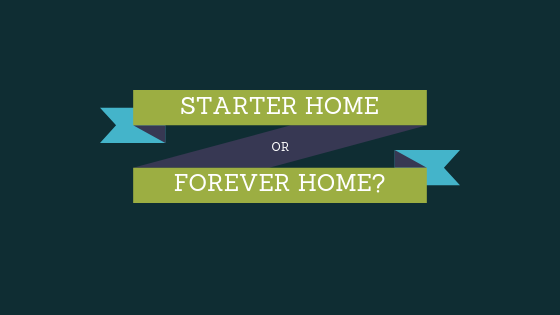Buying your first home is a big step. In fact, it’s a landmark event in most people’s lives. In the beginning stages of your very first real estate transaction, everything can seem daunting. How are you supposed to know where to start? How do you know what you’ll qualify for? How do you decide what kind of house is the best bang for your buck? Before you make any decisions, you’ll need to figure out exactly how much house you can afford, followed by how much house you actually need.
Starter Home…?
The fact is that in this day and age, there’s very little chance that you’ll stay in your first house long enough to pay off the mortgage. So instead of thinking long term, you might want to narrow your thinking down to your current needs and wants. You can always expand on those later on down the road. If you’re single or part of a young family, you probably don’t need too much out of your first house. While you obviously have preferences and needs that are unique to you, most buyers looking to buy an entry-level home won’t need much beyond a two- or three-bedroom house, townhome, or condo.
There are some great benefits to buying a starter home. First, when you opt for a smaller, less customized home, your options open up a little bit. If you want to live in the middle of the city or in a very popular part of town, you might have to start small anyway to meet budget constraints. Additionally, a smaller place typically means less upkeep and maintenance. Starting small also gives you the freedom to save, build equity, and “move on up” later once you’ve outgrown you starter home. When it’s time to sell, you may also have an easier time doing so, as entry-level homes are in higher demand than larger upgrades.
…or Forever Home?
If you’re lucky enough to have great job security and income stability, and you know you’ll be in your home for a while, it might be beneficial to spend a little more and have room to grow from the start. Be aware, though, that even if you can comfortably afford the monthly payment, you’ll need to factor in other expenses like maintenance and repairs for a larger home and/or lot. While the benefits of buying a starter home are pretty great, there are also benefits to starting out with your forever home. First of all, starting small means there’s almost a guarantee that you’ll be moving out and starting the buying process all over again in just a few years. If you know you want to start a family soon and know you don’t plan on leaving the area, why not go bigger from the beginning?
Other financial considerations to keep in mind are interest rates and market changes. If you can afford to get into your “forever home” now at a lower interest rate, it might be better for you in the long run. You just never know what interest rates or the local housing market are going to look like in the next five years or so. Buying that bigger home now instead of upgrading later means you’re locking yourself in to a lower rate and mortgage payment.
The Bottom Line
You want to be comfortable and not struggle to make your mortgage payment each month. It’s important to stay within a budget that will allow you to pay your mortgage comfortably and still be able to afford the little extras you love. No one wants to be “house poor.” Sit down with your financial advisor or mortgage lender and figure out your sweet spot—that perfect monthly payment that won’t take up the majority of your paycheck. Then, instead of looking at total purchase price, think about how much you want to spend each month. That will be a big deciding factor in whether your first real estate purchase is a starter home or your forever home.







